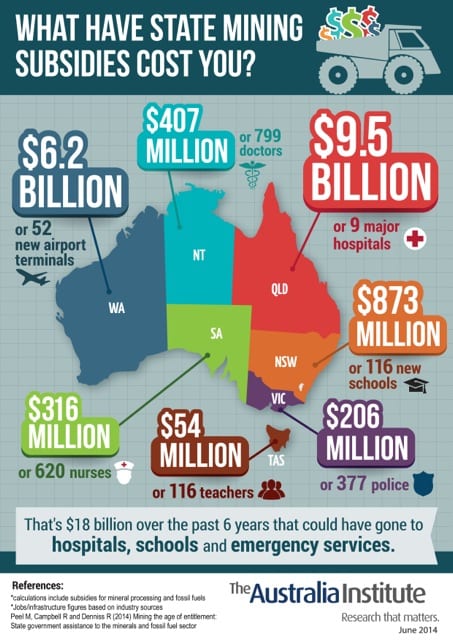From time to time the AustraliaInstitute insists on injecting facts and figures into political discussions. It has now produced a report on just how many billions a year the States spend supporting their mining industries. The figures are significant. For example, for 2013-14 state budget minerals and fossil fuel expenditures and concessions totalled about about $3.2 billion. For Qld this cost represented about 60% of the royalties it received. The figures look much worse when it is realized that no GST is paid on mineral exports (or other exports.) This loss of GST income to the states would have been worth about $19 billion for 2012!
(“Australian Mining” figures put the value of Australia’s 15 largest export commodities at $192.4 billion in 2013.)
It is also worth noting that the above does not include federal government subsidies and concessions nor local government costs. Local governments supporting FIFO are particularly poorly treated because the mines and their FIFO employees contribute little to local government income.
Details:
The mining industry reached the point some time ago where its very success is having a detrimental effect on the overall Australian economy. This is because the high value of mineral exports has pushed the $AUS well above its normal range. As a result, other export industries and industries that have to compete with imports are finding it hard to survive and often shutting down. In effect, industries that used to provide jobs and training are being replaced by an industry that employs only 2% of the workforce. Worse still, the end of the mining construction boom and falling commodity prices is seeing a significant shedding of the jobs created during the mining boom. (Tying a countries future to an industry as cyclic as mining is not a really smart thing to do.)
With this in mind it is worth looking at what contribution mining really is making to the country and to what extent that this is being actually subsidised by governments and ordinary tax payers.
Richard Dennis Director of the AustraliaInstitute provided the following in an REnewEconomy article:


I liked these quotes given just how much money is channeled to the mining industry:
The minerals council (nsw) rebuttal here.
And who is the Australia Institute ?
So not exactly non biased commentary.
( I make no argument, only adding information to the calm debate. )
Jumpy: Richard Denniss first came to my notice some years ago when I read something he wrote opposing the carbon price and pointing out all the circumstances where carbon prices wouldn’t work. Hardly what you would expect from the Green’s tame economist. What I have seen since has also been good stuff that deals in facts and figures instead of parroting the orthodoxy of the day.
REad what he writes, not where he has been.